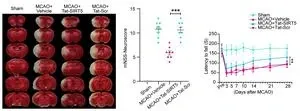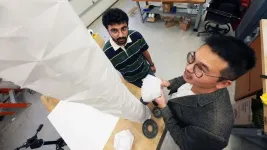(Press-News.org) LA JOLLA, CA— Ethanol—the compound found in alcoholic beverages—interferes with the normal functioning of a long list of biological molecules, but how each of these interactions contributes to the behavioral effects of alcohol is not fully understood. A guiding, but elusive, goal of researchers is to identify the protein (or proteins) to which ethanol binds that makes some people vulnerable to excessive drinking. Solving this question would point the way to effective therapies for alcohol use disorder, which affects more than 10% of the U.S. adult population and is responsible for a myriad of health and societal issues.
Previous studies identified one such molecule, a protein widely expressed in the brain, called the BK channel. Ethanol can directly interact with a component of BK channels, known as the α subunit, to facilitate their opening. However, scientists at Scripps Research found that this interaction may not drive behaviors related to alcohol abuse as much as previously thought. Their study, appearing in the journal Molecular Psychiatry on December 22, 2023, demonstrates that preventing ethanol from interacting with the BK α subunit does not reduce or increase the motivation to consume alcohol in mice.
The relationship between the BK α subunit and ethanol had previously been explored in vitro, ex vivo and in live invertebrates. Previous studies suggested that the BK α subunit was involved in an animal’s response to alcohol exposure, but there was a gap in understanding its role in mammals, particularly for the control of alcohol drinking.
“Knowing what a molecule does from in vitro experiments really doesn’t tell you much about what the behavioral consequences of that action might be,” says senior author Candice Contet, PhD, associate professor in the Department of Molecular Medicine at Scripps Research. “Things get complicated in vivo, because there are many layers of modulation that may occur in a cell-type specific manner. Moreover, the initial effect often changes with repeated or prolonged exposure to alcohol. We thus sought to determine whether the ability of ethanol to alter BK channel activity was in any way influencing the motivation to drink alcohol.”
Tackling this question didn’t lend itself well to conventional pharmacological testing: blocking BK channels with a drug causes tremors, which then interfere with drinking behavior. However, Contet’s collaborator Alex Dopico, MD, PhD, of the University of Tennessee, had identified a residue in the mouse BK α subunit that is required for ethanol to activate BK channels but is dispensable for normal BK channel activity, as shown in frog eggs. In the new study, Contet and her colleagues leveraged this discovery to unlock the significance of ethanol’s interaction with BK channels for alcohol drinking in mice.
Accordingly, the team tested mice that had a mutation in this particular BK α subunit residue. First, they found that the mutation prevented alcohol from altering the firing properties of neurons in the medial habenula, a brain region with high levels of BK channels, thereby demonstrating that it also confers resistance to ethanol in mouse brain cells, not just in frog eggs. At the behavioral level, the mice harboring the mutation did not display any anomalies when compared to control littermates. Notably, they exhibited the standard signs of intoxication upon alcohol injection, such as loss of balance and hypothermia, and they consumed the same amount of alcohol when tested under various conditions of moderate or excessive drinking.
“The lack of effect of the mutation was surprising, especially in light of our previous results showing that other BK channel subunits, β1 and β4, influence alcohol intake escalation in the same model of alcohol dependence,” says Contet. “However, these negative results, which were replicated in multiple cohorts and both sexes, are just as important as positive ones, because they encourage the field to study other targets rather than focusing on the wrong culprit.”
While the study does not point to a critical role of the BK α subunit in the motivation to drink alcohol or several physiological responses related to ethanol intoxication and withdrawal, the group will continue to explore whether the molecular target plays a role in other aspects of alcohol use disorder.
“Ethanol is highly pleiotropic. Beyond its reinforcing effects, it alters the functioning of multiple organs and cell types,” Contet says. “It is likely that ethanol’s interaction with BK channels contribute to some of these effects, but we've only explored the tip of the iceberg so far; the next challenge will be to find the right experimental readout.”
In addition to Contet, authors of the study, “Ethanol’s interaction with BK channel α subunit residue K361 does not mediate behavioral responses to alcohol in mice,” include Agbonlahor Okhuarobo, Max Kreifeldt, Pauravi Gandhi, Catherine Lopez, Briana Martinez, Kiera Fleck, Michal Bajo, Pushpita Bhattacharyya, Marisa Roberto and Amanda Roberts of Scripps Research; Alex Dopico of the University of Tennessee Health Science Center; and Gregg Homanics of the University of Pittsburgh.
This work was supported by funding from the National Institutes of Health (AA020913, AA006420, AA026685, AA027636, AA027372, AA020889, AA010422, AA021491, AA013498, AA011560, AA007456)
About Scripps Research
Scripps Research is an independent, nonprofit biomedical institute ranked one of the most influential in the world for its impact on innovation by Nature Index. We are advancing human health through profound discoveries that address pressing medical concerns around the globe. Our drug discovery and development division, Calibr, works hand-in-hand with scientists across disciplines to bring new medicines to patients as quickly and efficiently as possible, while teams at Scripps Research Translational Institute harness genomics, digital medicine and cutting-edge informatics to understand individual health and render more effective healthcare. Scripps Research also trains the next generation of leading scientists at our Skaggs Graduate School, consistently named among the top 10 US programs for chemistry and biological sciences. Learn more at www.scripps.edu.
END
Scripps Research scientists give new insight into a molecular target of alcohol
By investigating a molecule in the brain tied to cellular communication, scientists uncover important information about the proteins that do—and do not—influence alcohol drinking behavior.
2024-01-09
ELSE PRESS RELEASES FROM THIS DATE:
Coastal populations set to age sharply in the face of climate migration, FSU researcher finds
2024-01-09
As climate change fuels sea level rise, younger people will migrate inland, leaving aging coastal populations — and a host of consequences — in their wake, a study by Florida State University researchers finds.
While destination cities will work to sustainably accommodate swelling populations, aging coastal communities will confront stark new challenges, including an outflow of vital human infrastructure such as health care workers, said Associate Professor of Sociology Matt Hauer, lead author of the study published in the Proceedings of the National Academy of ...
World-renowned surgeon named new director of Moores Cancer Center at UC San Diego Health
2024-01-09
Following an extensive national search, Diane M. Simeone, MD, has been appointed director of Moores Cancer Center at UC San Diego Health, effective April 1, 2024.
Simeone brings robust institutional, national and international leadership experience to both oncologic patient care and scientific research, with a focus on establishing novel models of interdisciplinary collaboration. She is an internationally recognized surgeon-expert in the biology and multidisciplinary treatment of pancreatic neoplasms, with an active clinical practice in pancreatic surgery.
Simeone currently serves as the Laura and Isaac Perlmutter ...
Origami-inspired robotic plants grow with their environment
2024-01-08
How do you deploy an environmental sensor to collect climate change readings over a prolonged period on an uninhabited island without failing? How do you power a seismic detector to operate for months in an underwater cave?
In environments that are difficult to reach because of the hazards or hardships for humans, a device behaving like a native plant could be the answer. This is the approach taken by Suyi Li, associate professor in mechanical engineering at Virginia Tech, and Clemson professor and collaborator Ian Walker. Their work is being advanced ...
New research identifies high rates and common causes of diagnostic errors in hospitals across the nation
2024-01-08
Almost a quarter of patients who were admitted to the ICU or died in 29 hospitals in the United States experienced a diagnostic error
Efforts and initiatives are underway across the country to address and prevent the causes of diagnostic errors
A new study from researchers from Brigham and Women’s Hospital, a founding member of the Mass General Brigham healthcare system, in collaboration with researchers at the University of California San Francisco, has shed light on the rate and impact of diagnostic errors in hospital settings. In an analysis of electronic health records from 29 hospitals across the country of 2,428 patients who ...
Final supernova results from Dark Energy Survey offer unique insights into the expansion of the universe
2024-01-08
In 1998, astrophysicists discovered that the universe is expanding at an accelerating rate, attributed to a mysterious entity called dark energy that makes up about 70% of our universe. While foreshadowed by earlier measurements, the discovery was somewhat of a surprise; at the time, astrophysicists agreed that the universe’s expansion should be slowing down because of gravity.
This revolutionary discovery, which astrophysicists achieved with observations of specific kinds of exploding stars, called type Ia (read “type one-A”) ...
Life span increases in mice when specific brain cells are activated
2024-01-08
In recent years, research has begun to reveal that the lines of communication between the body’s organs are key regulators of aging. When these lines are open, the body’s organs and systems work well together. But with age, communication lines deteriorate, and organs don’t get the molecular and electrical messages they need to function properly.
A new study from Washington University School of Medicine in St. Louis identifies, in mice, a critical communication pathway connecting the brain and the body’s fat tissue in a feedback loop ...
Robotic rehab aims to help stroke patients regain hand dexterity
2024-01-08
Every year, about 800,000 new stroke cases are reported in the United States, often causing patients problems with both neurological and physical motor control. Disruptions in the mobility of the arms and hands, in particular, can have devastating impacts on stroke patients’ quality of life.
The restoration of arm extremity and hand dexterity are often the highest priority among stroke patients. A new robotic platform developed at the University of Rhode Island, which utilizes both a patient’s brainwaves and muscle activity, aims to help post-stroke patients perform needed rehabilitation and regain critical motor skills, including complex tasks like reaching and grasping ...
Illinois Tech launches sensor technology program with emphasis on veteran education
2024-01-08
CHICAGO—January 8, 2023—Illinois Institute of Technology (Illinois Tech) has received a substantial grant from the National Science Foundation (NSF) to launch a pioneering education program in sensory technology aimed at underrepresented groups—particularly veterans. The initiative, funded through NSF’s Experiential Learning for Emerging and Novel Technologies (ExLENT) program, underscores Illinois Tech’s commitment to critical future technologies and expanding education to groups that have historically ...
Study highlights barriers to contraceptive access for disabled Medicare enrollees
2024-01-08
PITTSBURGH — Contraceptive use is low among reproductive-aged people with disabilities who are enrolled in Medicare, according to a new study from the University of Pittsburgh that highlights how lack of contraceptive coverage by Medicare may prevent disabled enrollees from accessing contraception.
Published today in the January issue of Health Affairs, the study provides the first national overview of contraceptive use among enrollees in Medicare, the government health insurance for people over 65 and for people with qualifying disabilities. ...
Study of national data demonstrates the value of acute hospital care at home
2024-01-08
Since the Centers for Medicare and Medicaid Services launched the Acute Hospital Care at Home (AHCaH) Waiver in 2020, thousands of patients from across 300 hospitals in 37 states have been treated in their homes. Yet little is understood about these patients’ outcomes on a national level, and the waiver will end in December 2024 unless there is an act from Congress. A new study by investigators from Mass General Brigham analyzed outcomes from AHCaH for a diverse group of patients across America. The study provides preliminary evidence suggesting that home hospital ...
LAST 30 PRESS RELEASES:
Duke-NUS scientists identify more effective way to detect poultry viruses in live markets
Low-intensity treadmill exercise preconditioning mitigates post-stroke injury in mouse models
How moss helped solve a grave-robbing mystery
How much sleep do teens get? Six-seven hours.
Patients regain weight rapidly after stopping weight loss drugs – but still keep off a quarter of weight lost
GLP-1 diabetes drugs linked to reduced risk of addiction and substance-related death
Councils face industry legal threats for campaigns warning against wood burning stoves
GLP-1 medications get at the heart of addiction: study
Global trauma study highlights shared learning as interest in whole blood resurges
Almost a third of Gen Z men agree a wife should obey her husband
Trapping light on thermal photodetectors shatters speed records
New review highlights the future of tubular solid oxide fuel cells for clean energy systems
Pig farm ammonia pollution may indirectly accelerate climate warming, new study finds
Modified biochar helps compost retain nitrogen and build richer soil organic matter
First gene regulation clinical trials for epilepsy show promising results
Life-changing drug identified for children with rare epilepsy
Husker researchers collaborate to explore fear of spiders
Mayo Clinic researchers discover hidden brain map that may improve epilepsy care
NYCST announces Round 2 Awards for space technology projects
How the Dobbs decision and abortion restrictions changed where medical students apply to residency programs
Microwave frying can help lower oil content for healthier French fries
In MS, wearable sensors may help identify people at risk of worsening disability
Study: Football associated with nearly one in five brain injuries in youth sports
Machine-learning immune-system analysis study may hold clues to personalized medicine
A promising potential therapeutic strategy for Rett syndrome
How time changes impact public sentiment in the U.S.
Analysis of charred food in pot reveals that prehistoric Europeans had surprisingly complex cuisines
As a whole, LGB+ workers in the NHS do not experience pay gaps compared to their heterosexual colleagues
How cocaine rewires the brain to drive relapse
Mosquito monitoring through sound - implications for AI species recognition
[Press-News.org] Scripps Research scientists give new insight into a molecular target of alcoholBy investigating a molecule in the brain tied to cellular communication, scientists uncover important information about the proteins that do—and do not—influence alcohol drinking behavior.







